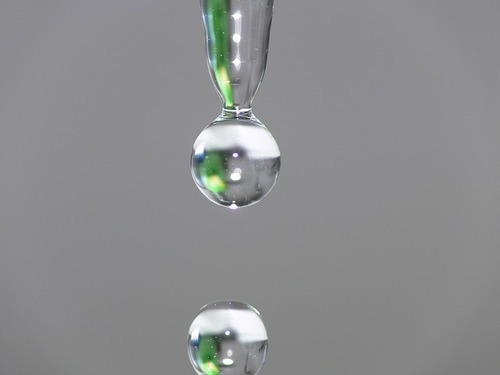Is Water Bad For You?
Also Known As: h2o
Short answer
Water is one of six essential nutrients for life. You need water to live, period.
Recommended Alternative
Very healthy and numerous health benefits. Side effects are rare. Things rated an 'A+' are typically necessary for survival (for example, water).
View Full Grading System
Category 'A'
Very healthy and numerous health benefits. Side effects are rare. Things rated an 'A+' are typically necessary for survival (for example, water).
Very healthy and numerous health benefits. A few harmful qualities may be associated, but only under certain circumstances such as an allergic reaction.
Very healthy and numerous health benefits. Harmful qualities may be associated, but aren't usually serious.
It is important to note that even the best things in life can become bad in immoderate amounts. So, although something may be rated an 'A+', overconsumption/overdoing can bring unwanted effects.
Category 'B'
Very beneficial to your health. Things rated a 'B+' may have a few harmful qualities to pay attention to.
Overall beneficial to your health. Things rated a 'B' may have some harmful qualities to pay attention to.
More beneficial to your health than not. However, harmful qualities are most likely associated and shouldn't be overlooked.
The main difference between category 'A' and category 'B' is the harmful qualities typically present in 'B' items. Serious side effects are usually uncommon, but are still possible and should be taken note of.
Category 'C'
Both beneficial and harmful qualities associated. Things rated a 'C+' are typically a bit more on the beneficial side. Still, moderation is important.
A fairly even ratio of beneficial and harmful qualities. Moderation is important. Very general topics that can lean towards both sides of the spectrum will be placed here as well. Rice, for example, can be good or bad depending on the type.
More harmful than beneficial. Side effects are common, especially when consumed/done excessively. Moderation is very important.
Category 'C' usually denotes to both good and bad qualities. When it comes to this category, it is important to keep this word in mind: moderation.
Category 'D'
Harmful to your health. Although benefits may be associated, the bad most likely outweighs the good. Moderation is very important.
Harmful to your health. A few benefits may be associated, but the bad outweighs the good. Moderation is extremely important.
Harmful to your health. Very few, if any, benefits are present. Things in this category should be avoided as much as possible.
Category 'D' is typically for things that are more harmful than beneficial. While consuming/doing something unhealthy once in a blue moon shouldn't hurt, we definitely recommend eliminating 'D' items as a regular part of your routine/diet.
Category 'F'
Category 'F' is for things that fail to bring anything beneficial to the table, and are very harmful to your health. We recommend completely avoiding anything in this category. Long-term side effects of 'F' items are usually very serious.
Category 'N'
'N' stands for neutral. Things placed into this category are generally (a) neither good nor bad for you, or (b) lack the necessary evidence to reach any conclusions.
Long answer
Water is an essential nutrient for life. You need it to function properly and not drinking enough water daily can be detrimental to your health. In fact, the average person can only go 3 days without it.
Our bodies consist of nearly 60-70% water. It is used to rid our bodies of unwanted toxins, carry nutrients to cells, and keep many tissues perfectly moisturized. Unfortunately, when we excrete waste, breathe, and sweat, tons of water is lost. If the water isn't replaced by drinking more we become dehydrated.
Dehydration inhibits the body from performing many of its normal functions, such as those previously stated. Many might experience side effects like dizziness, weakness, confusion, dry mouth, palpitations, and fainting. If you are experiencing any of these, it may be a good sign that you need to drink some more water!
So, how much water should you drink a day? The Institute of Medicine recommends the average male consume 13 cups, and female 9 cups daily. This may vary, however, based on your lifestyle. Those who exercise constantly will need to consume more water than someone who sits in front of a computer all day. Someone who lives in very humid weather should also drink more water when compared to someone who does not.
If you are interested in seeing how drinking too much water can affect you, click here.

Benefits
- transport nutrients to cells
-
flush toxins
-
keep skin healthy
-
keep liver healthy
-
provides energy
-
maximize physical performance
-
moisturize tissues
-
improves kidney function
-
improved brain function
-
maintain normal bowel movement
-
prevent hangovers
-
assist in weight loss
-
best thirst quencher
Our Wellness Pick
(what is this?)
Essentia Alkaline Water
- 99.9% purity level
- Infused with electrolytes
- High 9.5 pH balance
- Clean, smooth taste
Learn More!
Please turn your Ad Blocker off to see this content. Thank you!
Thank you for your feedback!
Written by Kathan Natrajan
Published on: 12-28-2015
Last updated: 11-30-2023
Thank you for your feedback!
Written by Kathan Natrajan
Published on: 12-28-2015
Last updated: 11-30-2023

 Approved by
Approved by 















